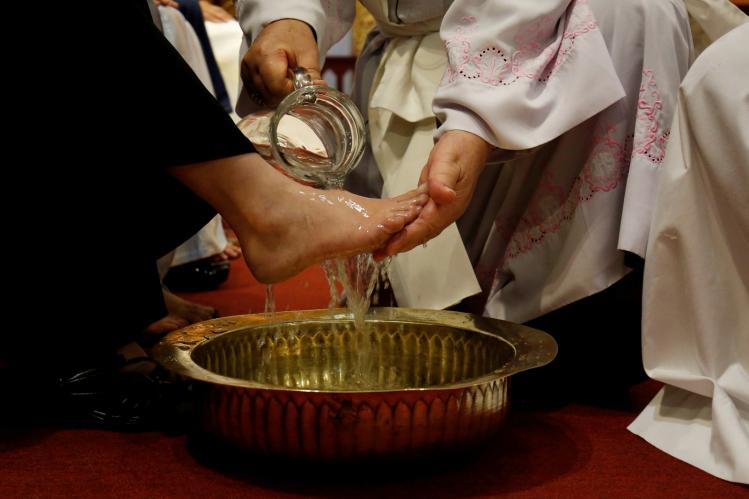
Last year, on Holy Thursday, we marched from Iglesia Hispana Emanuel to La Superior Carnicería in Durham, North Carolina, all of us carrying signs and banners, chanting against the federal government’s deportation of undocumented members of our community. We processed through town, past Latinx neighborhoods and storefronts, bearing crosses, remembering people who had been torn from households by la migra. We eventually assembled in the parking lot of a grocery store for a holy footwashing, a worship service in solidarity with members of our immigrant community. In it we commit our hands to serve their lives, bowing before them in reverence.
I took my place at a chair, with a gallon jug of water and a stack of towels. I held in my hands the feet of each person in line, one after another. A young girl, perhaps eight years old, plopped herself before me. After I washed her feet, she returned to the back of the line and waited for another turn. Over and over she took a seat in front of me and said, “My feet got dirty again.” Then she stuck them over the basin while I poured water and dried them with a towel. She smiled. I knew this child. I had washed her feet before, during our past holy week footwashing protests. Her dad brings her every year. She’s always the first in line.
A woman sat in front of me and lifted her foot toward me. I remembered her because she’s missing most of her big toe. As she held her feet over the basin, ready for the water, I noticed that the rest of her toenails were painted with a bold, purple nail polish.
One man was led to my chair—a gracious elder who approached unsteadily. He first set his hat on the ground, then reached down to undo his shoelaces. He kicked off his shoes but couldn’t manage to pull off his socks. In his lap, his hand trembled with palsy. I reached down to his socks, gently pulling them off. I took his bare feet and washed them. They quivered in my hands.
Next an older woman slipped off her shoes—black velvet, well-worn. As I poured the water, I wished I was a palm reader, but for feet—and not to predict her future, but to read her past. As I held her bare feet, I wished I could read the life written in the wrinkles of her toes, her heels, her soles. There were stories in those feet, if I could decipher them.
As another pastor offered a closing prayer, the girl returned, asking now if she could wash my feet. She took my hand and led me to a chair, asking me to take off my boots. The jug was too heavy, so I lifted it with her. Together we poured the water, which she rubbed into my feet. Then she took a towel and meticulously dried them, even between my toes.
We wash feet because we care for one another with holy reverence, with humility and kindness, holding onto our neighbors and friends, embracing people that la migra wants to tear away from us. Footwashing reminds us that we are fragile creatures, that human life is vulnerable and precious—and that God holds all of this, all of us, in her hands.
There are mysteries in the water, in the hands and feet—the wonders of God’s love washing over us. The wrinkles in feet, the calluses on heels, the lines crossing through soles tell the story of God.

